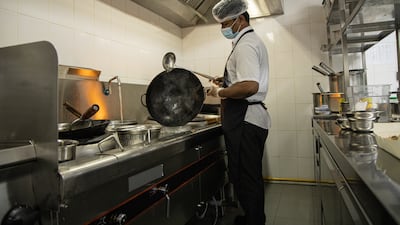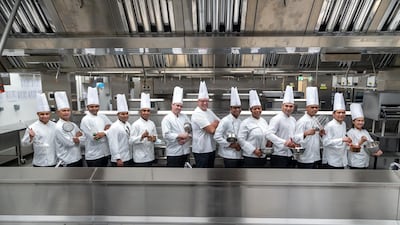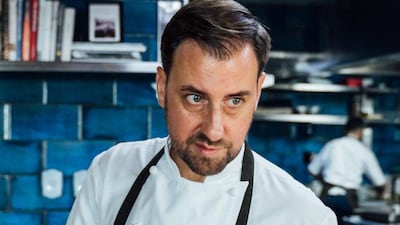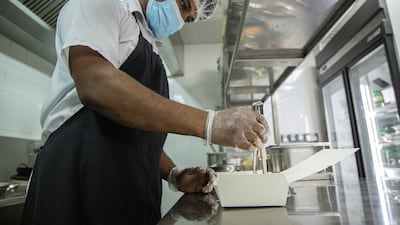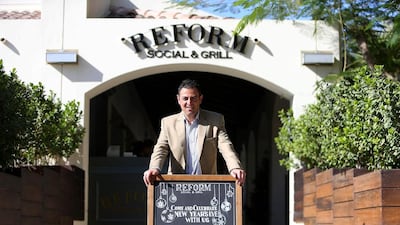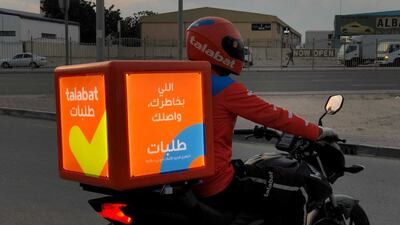We once bought in pizza as a weekly treat – ordered over the phone and delivered piping hot by dedicated delivery staff.
Now, many of us get our daily meals – not to mention fresh produce, household essentials and all manner of other goods – from a motorcycle rider at our front door.
The scale of the change has been rapid and dramatic and hastened by the pandemic. And none more so than the rise of dark kitchens, or cloud kitchens, where chefs prepare meals off-premises to reach a wider delivery-only market.
In an attempt to reduce interaction, people turned to apps to order from their local restaurants and it's a trend that seems likely to grow.
Online sales for the UAE’s food and beverage market surged 255 per cent year-on-year in 2020 to $412 million, according to a study by Dubai Chamber of Commerce and Industry released in February. This is projected to reach $619m by 2025.
Delivery firms are stepping up their operations to meet demand.
Folly restaurant, Madinat Jumeirah
Talabat, which recorded 90 per cent year-on-year growth in online orders during the first half of 2021, announced plans to double its riders to reduce delivery times to tap into the potential of “quick commerce".
Localised kitchens for faster deliveries sound ideal, but what does that mean for the traditional restaurant industry?
“Cloud kitchens have contributed greatly to improving the quality of service rendered to customers,” said Joe Frem, Talabat’s vice president of cloud kitchens and concepts in the Mena region.
“Our facilities have a capacity to deliver between 600 to 1,000 daily orders on any given day with the catchment area limited to a 15-minute drive time.
“This helps our partners deliver better service to our customers.”
Dark kitchen providers offer restaurants the opportunity to use their facilities to prepare food on site, with customers ordering through an app.
Talabat currently has seven kitchens in the UAE, with plans to grow to 12 by the end of this year.
The firm says each kitchen can cater for up to 35 different restaurant brands at a time.
A recent survey by Dubai Restaurants Group showed 70 per cent of dine-in restaurants in the emirate were exploring the idea of investing in the sector.
Easy access to market
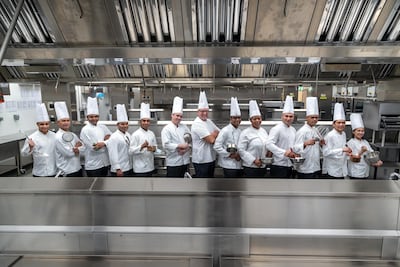
With a clear shift in consumer behaviour, Mr Frem said the dark kitchen market was proving to be so popular that many companies were setting up to operate without an actual kitchen or restaurant of their own.
“Cloud Kitchens present restaurants with the opportunity to reach their customers at a very low cost,” said Mr Frem.
“This has shaped the food scene, because what was a high barrier to entry is now marginally much lower.
“With a lowered risk, confidence is increasing and we are allowing not only established brands to expand their territories, but new SMEs to enter the market, as well as giving entrepreneurs the confidence to introduce different cuisines and concepts to the market.”
However, Mr Frem said restaurants that relied solely on online orders, with no actual premises of their own, were missing out on potential business.
“The main disadvantage is not gaining the organic traction that comes from being physically present in front of customers,” he said.
“We always recommend our partners to adopt the bricks and clicks business model, which entails a mix between bricks and mortar and cloud kitchen locations.”
It takes a colossal amount of food to operate dark kitchens in the UAE, which is good news for food suppliers.
On a given day, 200kg of chicken, 100kg of red meat, 80kg of potatoes and 40kg of rice is used in each of Talabat’s kitchen facilities across the country.
New dark kitchens are popping up all over the Emirates.
High failure rate among dark kitchen start-ups
Deliveroo has two kitchens in Hessa Street, including the world's largest, as well as kitchens in Business Bay and Jumeirah Lakes Towers.
DKitchen, in Silicon Oasis, Dubai, is home to 25 restaurant brands, serving up to 3,000 meals a day.
“The introduction of dark kitchens has given restaurateurs the opportunity to deliver directly to customers whilst avoiding the expenses associated with retail models,” said Manhal Naser, chief executive of AWJ Investments, the company behind DKitchen.
“This allows for food to be prepared in an efficient, low-cost environment and at great speed, turning it into a production and processing environment rather than a culinary dining experience.”
While dark kitchens help to drive revenue, he said restaurant brands needed to make sure they did their homework before committing.
“We studied the current dark kitchen market very closely and found that many are struggling to drive profit due to their operational costs, aggregator fees and lack of supply chain knowledge,” he said.
“The operation of a dark kitchen is complex and needs to be finely tuned to reap generous profits.
“It carries a risk of failure due to high costs, especially if the facility is not managed by operators with production and delivery experience.”
Another entry into the UAE dark kitchen market is Abu Dhabi’s Erth, which has launched a “central production unit” that can provide 100,000 meals a day in a 9,000 square metres building, where 150 chefs from 25 different countries operate.
“The inauguration of the CPU is a significant boost to the food services sector here in Abu Dhabi and across the UAE,” said Alain Verhoeven, Erth’s catering facility director.
Impact on traditional restaurants
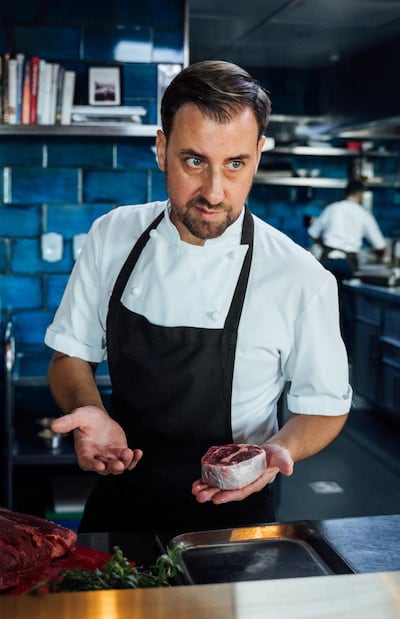
However, not everyone is convinced the rise of dark kitchens is going to be good news for consumers in the UAE.
“It’s going to have a negative effect on people’s health because the majority of what’s being made in dark kitchens is unhealthy fast food,” said Nick Alvis, chef at the popular Dubai restaurant Folly.
“I understand there is a growing market for dark kitchens because they are cheaper and more convenient.
“But it’s a case of quantity over quality and it’s going to do a lot of damage to the traditional restaurant industry.”
Naim Maadad, the founder of Gates Hospitality in Dubai, was also critical of the impact dark kitchens would have on his industry.
“It will definitely have a negative impact on our business and there are multiple levels of danger,” said Mr Maadad.
“I will never touch these guys because they are hiding behind shadows.
“A lot of the time we don’t even know where the kitchen is that the food is being made in, which is not the case with traditional restaurants.”
He said customers would not get the same quality they would receive from a more traditional restaurant, as the emphasis with dark kitchens was on pushing out as much food as possible.
“It’s often one kitchen catering for up to 10 different cuisines in dark kitchens,” he said.
“Some of them are doing amazing quality foods, to be fair, but how likely is it they will be able to sustain it?
“What one chef is an expert in 10 different styles of cuisine?”
